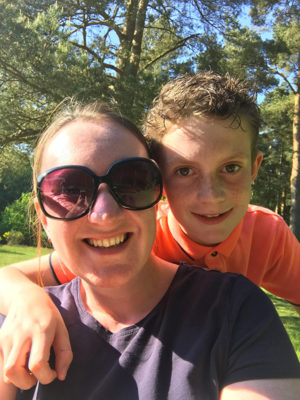Matthew Lessells had a lucky escape. When he was just 13 months old, his mother, Gemma, noticed her baby son appeared to be unwell. At first, she thought he had a tummy bug but his condition quickly worsened. Matthew’s body became floppy and unresponsive; his lips turned blue and he collapsed in Gemma’s arms.

Gemma called an ambulance and Matthew was rushed to hospital where he was diagnosed with meningitis. ‘Meningitis is every parent’s worst nightmare,’ says Gemma. ‘I was astonished at how quickly Matthew went from being fine to literally fighting for his life.’
Prompt diagnosis and treatment saved Matthew’s life but recovery from his illness was a slow process. Gemma, a school teacher, recalls how her son would tire easily, needed several hearing tests, and had delayed expressive speech. He has since made a full recovery.
Today, 10 years on, Gemma encourages other parents to ensure their children are vaccinated against Meningitis B – a jab which was unavailable when Matthew was a baby:
‘As meningitis is the one disease that parents fear the most, any vaccine that protects against it is going to offer a sense of security and peace of mind. Parents have to remember that the MenB vaccine does not cover all strains of the disease so they need to be aware of the signs and symptoms, and to seek treatment quickly.’
New study
Gemma’s experience chimes with new research from the University of Bristol, supported by the Meningitis Research Foundation in the UK and published in the journal Vaccine. Researchers found that peace of mind can play a crucial role in influencing parents’ attitude to vaccines.
Based on focus groups, it was found that many parents experienced a sense of reassurance from knowing that when an individual was vaccinated it would offer some level of protection against a disease. The sense of security was strongest among those who tended to view vaccination as intrinsically beneficial. It was less pronounced in parents who simply considered vaccination as a routine health intervention said that they did not receive peace of mind benefits.
Discussion from one focus group reported that the longer a vaccine had been introduced, the more safe it felt to them. Participants were more cautious about vaccinations that they considered to be ‘newer’ or vaccinations that they had little personal experience with. There were exceptions to this for severe illnesses such as meningitis. The MenB vaccine, although considered relatively ‘new’ by some participants, provided increased reassurance because of the perceived severity of the disease.
What price peace of mind?
The researchers argue that the psychological benefit to many parents should be given more weight when authorities assess the benefits of vaccines. The peace of mind offered by vaccination could also be emphasised in vaccination campaigns.
Lead author of the new paper, Dr Gemma Lasseter, University of Bristol, says the findings ‘indicate that the current economic approach used to make funding decisions about healthcare interventions in the UK may need to be refined to take peace of mind into consideration in the future’.
Dr Hannah Christensen, co-author, believes the challenge now is to work out ‘how we can appropriately capture the value of this peace of mind benefit so that it can contribute meaningfully to the vaccine decision-making process’.
Vinny Smith, Chief Executive at Meningitis Research Foundation, said this study also gives us insight that beliefs about vaccines can change. ‘More time for conversations between healthcare professionals and parents could help address incorrect beliefs about vaccines and increase knowledge of the benefits,’ she says.
For Gemma Lessells, the opportunity to protect against meningitis is priceless. However, she adds that parents should continue to remain vigilant, even if they have availed of all available vaccines. ‘Trust your instincts and if something is wrong seek medical advice, don’t wait for a rash and don’t be afraid to get a second opinion,’ she says.




